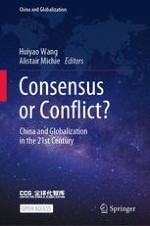Open Access 2021 | Open Access | Buch | 1. Auflage

Consensus or Conflict?
China and Globalization in the 21st Century
herausgegeben von: Huiyao Wang, Alistair Michie
Verlag: Springer Nature Singapore
Buchreihe : China and Globalization
Open Access 2021 | Open Access | Buch | 1. Auflage

herausgegeben von: Huiyao Wang, Alistair Michie
Verlag: Springer Nature Singapore
Buchreihe : China and Globalization
This open access book brings together leading international scholars and policy-makers to explore the challenges and dilemmas of globalization and governance in an era increasingly defined by economic crises, widespread populism, retreating internationalism, and a looming cold war between the United States and China. It provides the diversity of views on those widely concerned topics such as global governance, climate change, global health, migration, S&T revolution, financial market, and sustainable development.
It is a truly unique book. Never before has such an authoritative group of essayists come together to develop deep new thinking about global governance that is relevant to current shared global challenges. They express deep concerns about the historically unprecedented upheavals in the world. They describe the unparalleled turbulence that mankind is facing in the form of multiple crises, any one of which has the potential to bring civilization to its knees. The most obvious of these is the threat posed by climate change. They spell out why these perils pose a stark choice for the human race. They stress how any path that leads to conflict increases the risk of catastrophe. In this context, the common thread is that a consensus must be reached about the future of our world. They have put forward many ideas and potential new policies, reflecting their vision of what this consensus should be and how it is the only way forward for the human race.